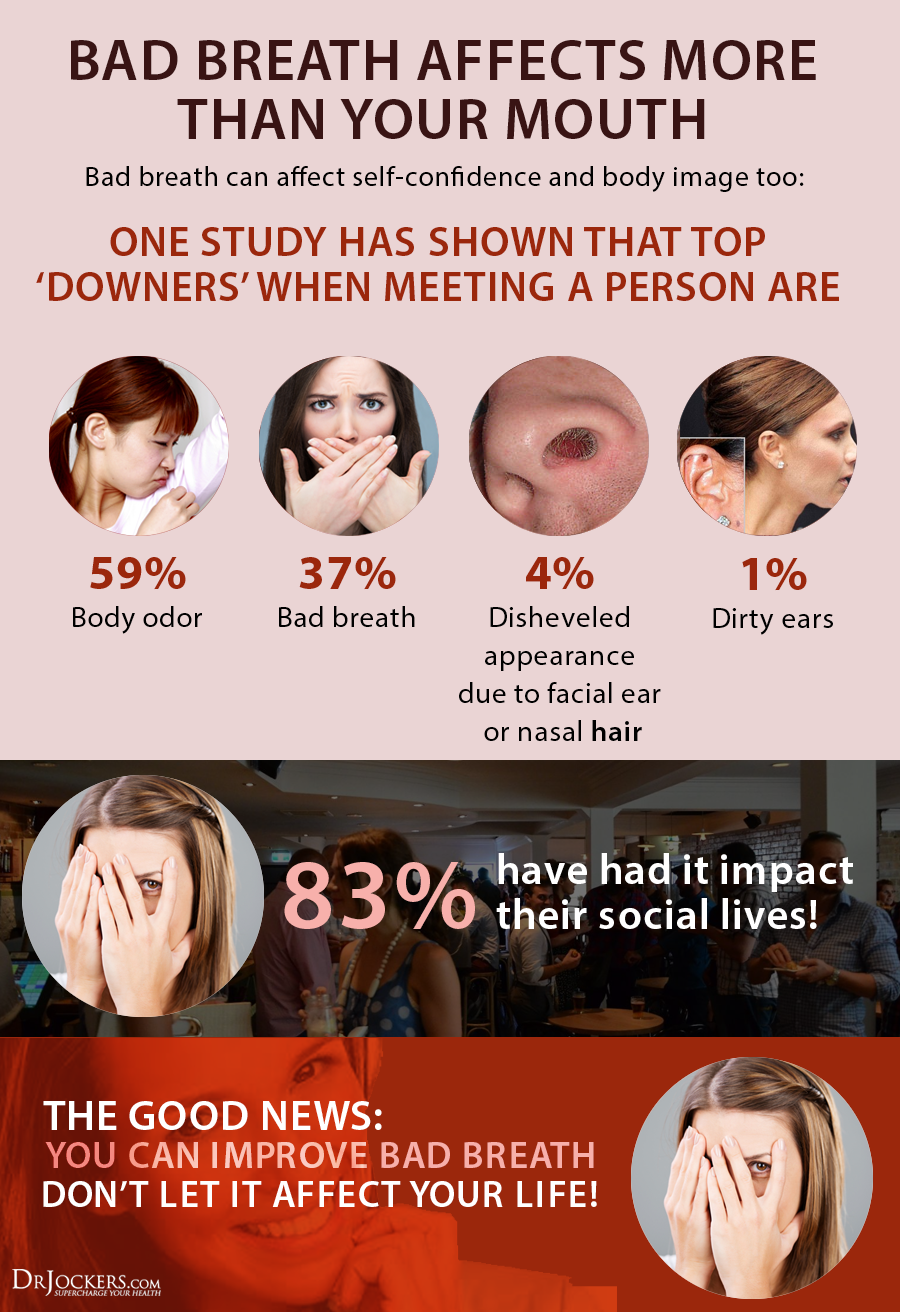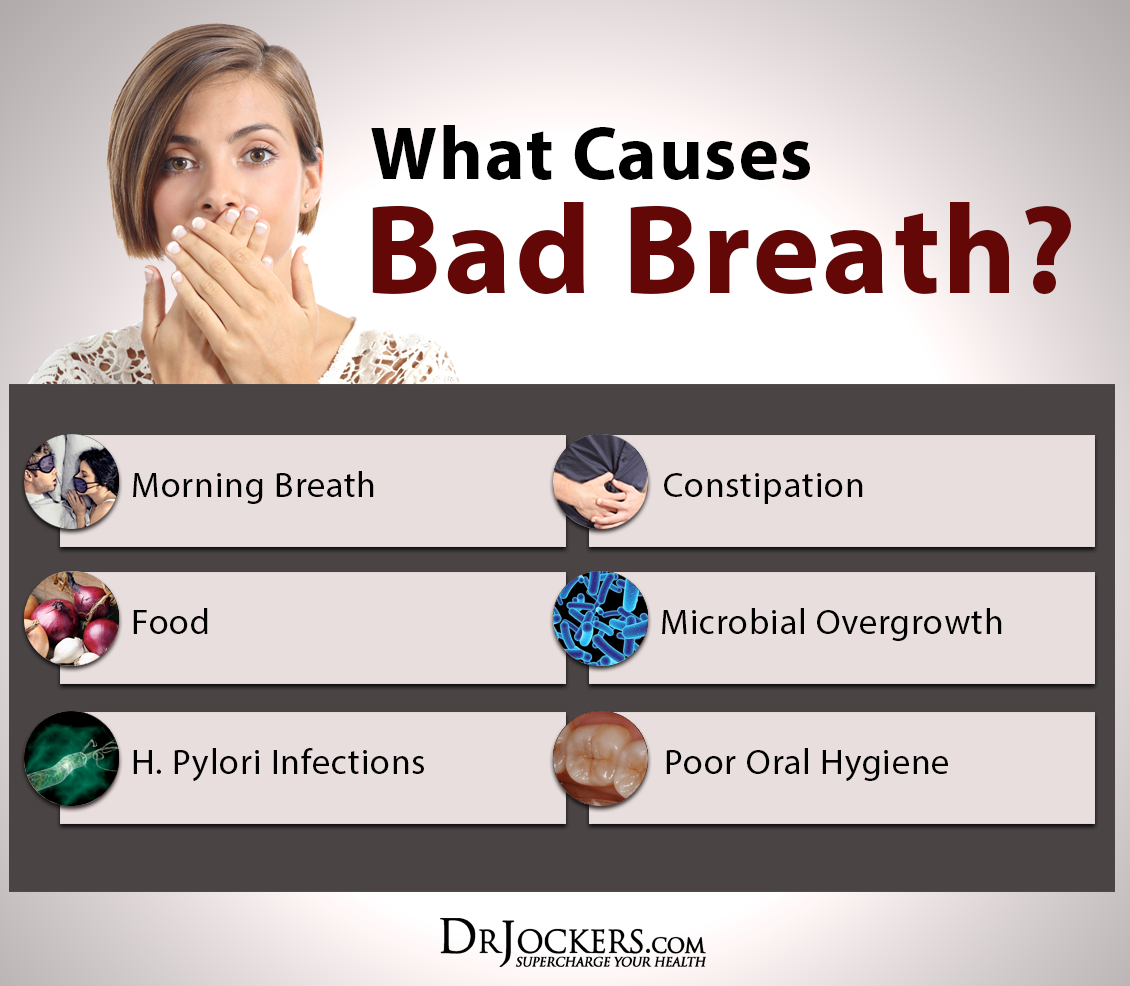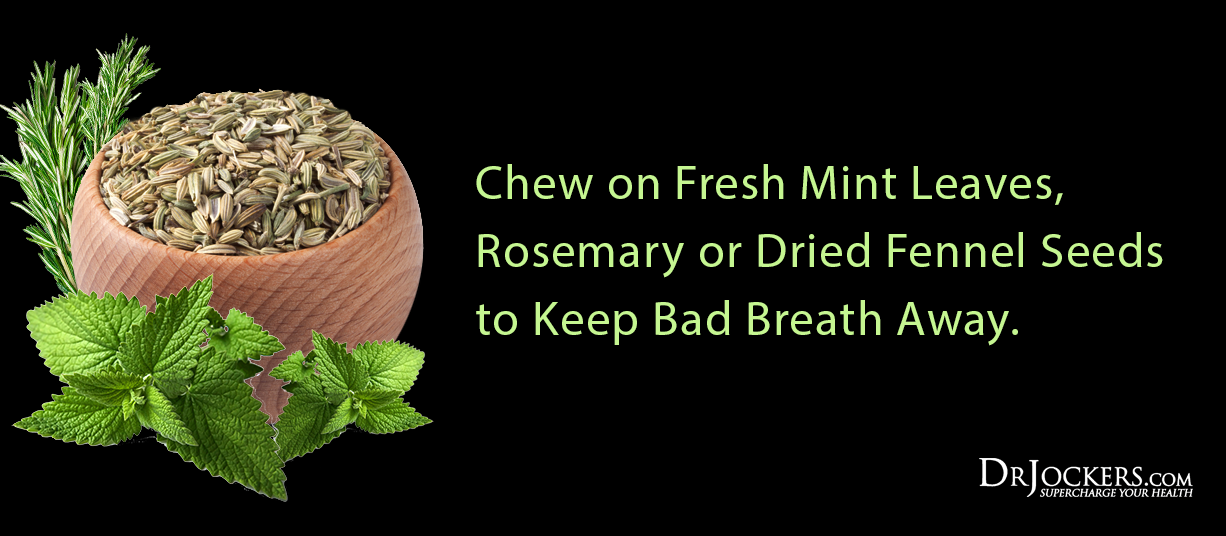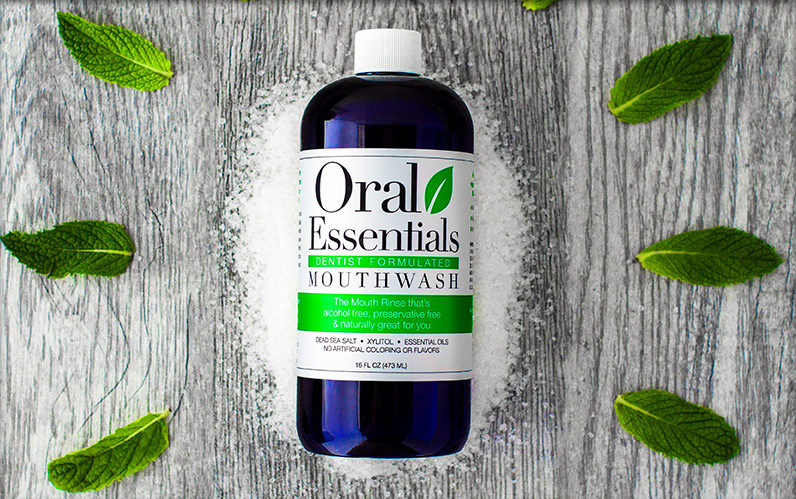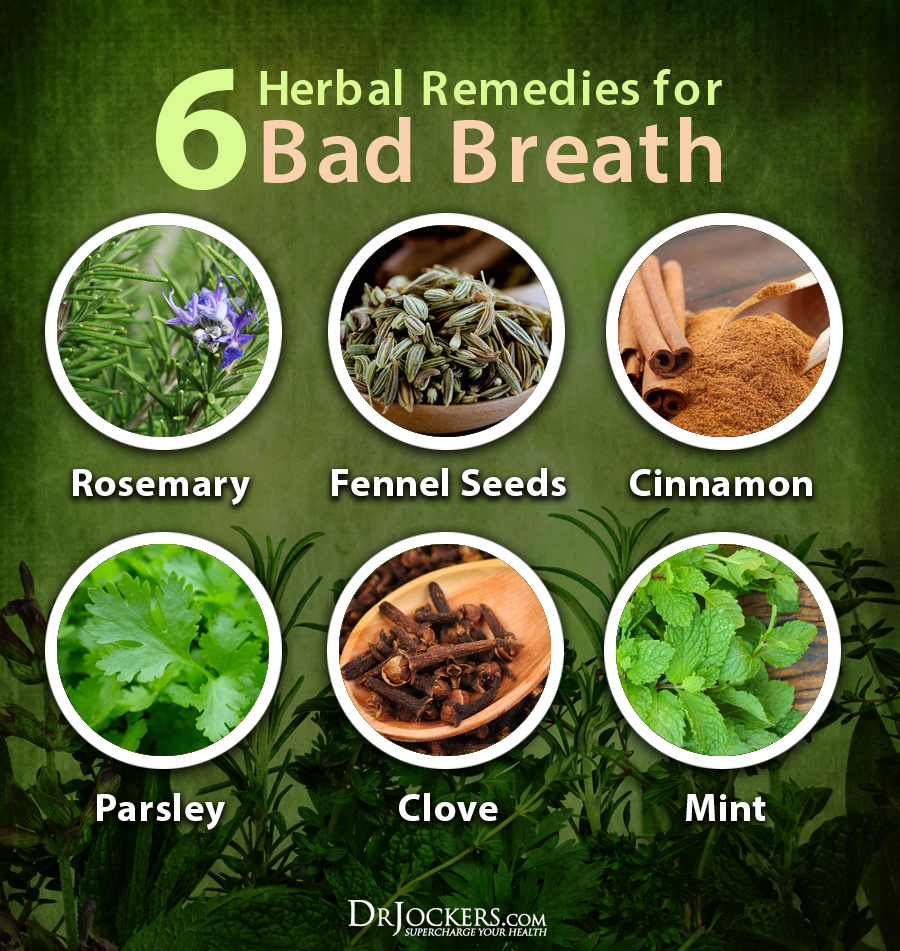8 Natural Strategies to Improve Bad Breath
Bad breath or halitosis is better referred to as any unpleasant odor that emanates from the mouth. It affects greater than 50% of the population and is common in all ages (9, 22). Aggravated by a variety of contributing factors, bad breath can be chronic in some individuals.
Although embarrassing, bad breath can be a sign of a more serious health disturbance. Fortunately, clewing into your health can help you detect the cause of halitosis and allow you to treat it naturally with the 8 strategies that follow in this article.
What Causes Bad Breath?
Volatile sulfur compounds are the primary cause of this unpleasant mouth odor (9). Specifically, hydrogen sulfide, methyl mercaptan, and dimethyl sulfide are responsible for synthesizing odor-producing bacteria in the oral cavity and can be toxic to tissue (10).
The odor may last for several hours but may persist continuously in some individuals depending on their habits and health. Here are several factors involved in the causation of bad breath.
1) Morning Breath:
Almost everyone experiences bad morning breath to some degree. “Morning halitosis” is present because our mouth is dry during the sleeping hours and bacteria levels increase along with the debris they produce. This leads to the classic morning breath.
This is much worse with individuals experiencing a respiratory tract or sinus infection. If you are sleeping in a dry or hot environment it will worsen your dehydration and morning breath as well (22).
The more hydrated one is, the less morning breath they will experience. A cool environment and breathing from the nose while sleeping as opposed to mouth breathing will also reduce morning breath.
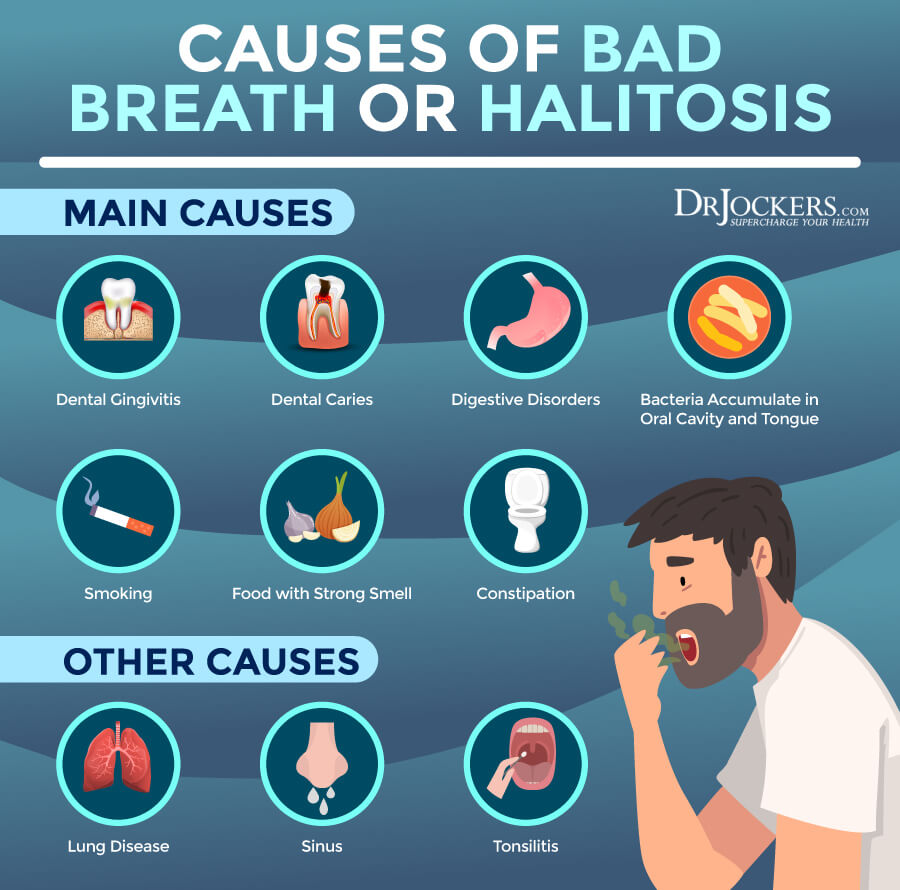
2) Food:
Odor is produced by bacteria as a byproduct of the food you eat. Glucose, salivary agents like proteins and mucins, peptides found in milk, eggs, and soybeans, as well as any lingering food debris that feeds the bacteria (9).
Foods like onions, garlic, and cruciferous vegetables also contribute to bad breath. These foods contain sulfur which when degraded by chewing and the release of enzymes in the saliva leave behind remnants of sulfurous compounds in the oral cavity.
Bacteria and sulfur compounds are commonly left behind on the tongue and in the gum pockets of people who avoid the practice of flossing and tongue scraping (22).
3) H. Pylori Infections:
Bad breath may be the least of your concerns if it is a result of Helicobactor pylori (H. pylori) infection. H. pylori infections are commonly associated with cancer of the gastrointestinal tract and stomach ulcers but they can also infect the oral cavity. The colonization of these pathogenic bacteria is associated with an increased risk of inflammation of the oral cavity, periodontal disease, and halitosis.
One research group conducted a study that showed almost 16% of individuals with gum disease expressed H. pylori infections in their mouths (21). Patients with the infection were also found to be carriers of other virulent bacteria like P. intermedia that cause bad breath and disease.
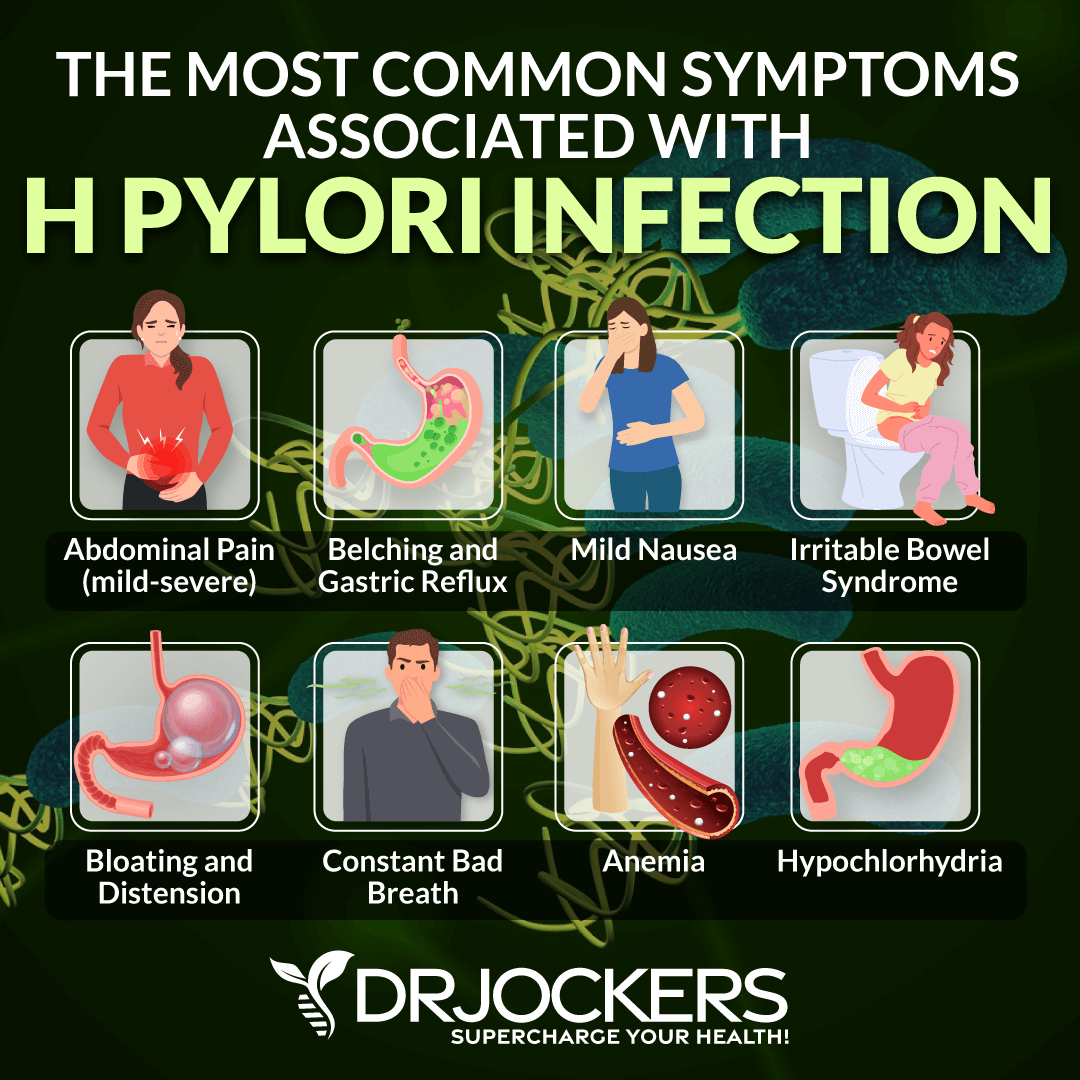
4) Constipation:
Individuals who suffer from chronic constipation are also believed to deal with bad breath regularly. Researchers in Denmark found that approximately 25% of people who have chronic bad breath yet have good oral health struggle with constipation (20).
Food that becomes stagnant in the gut provides a feeding ground for bacteria to overgrow. The increased activity of bacterial fermentation in the gut leads to gas, bloating, inflammation, weakened immunity, and increases the susceptibility of harmful bacteria and their toxins to migrate throughout the body.
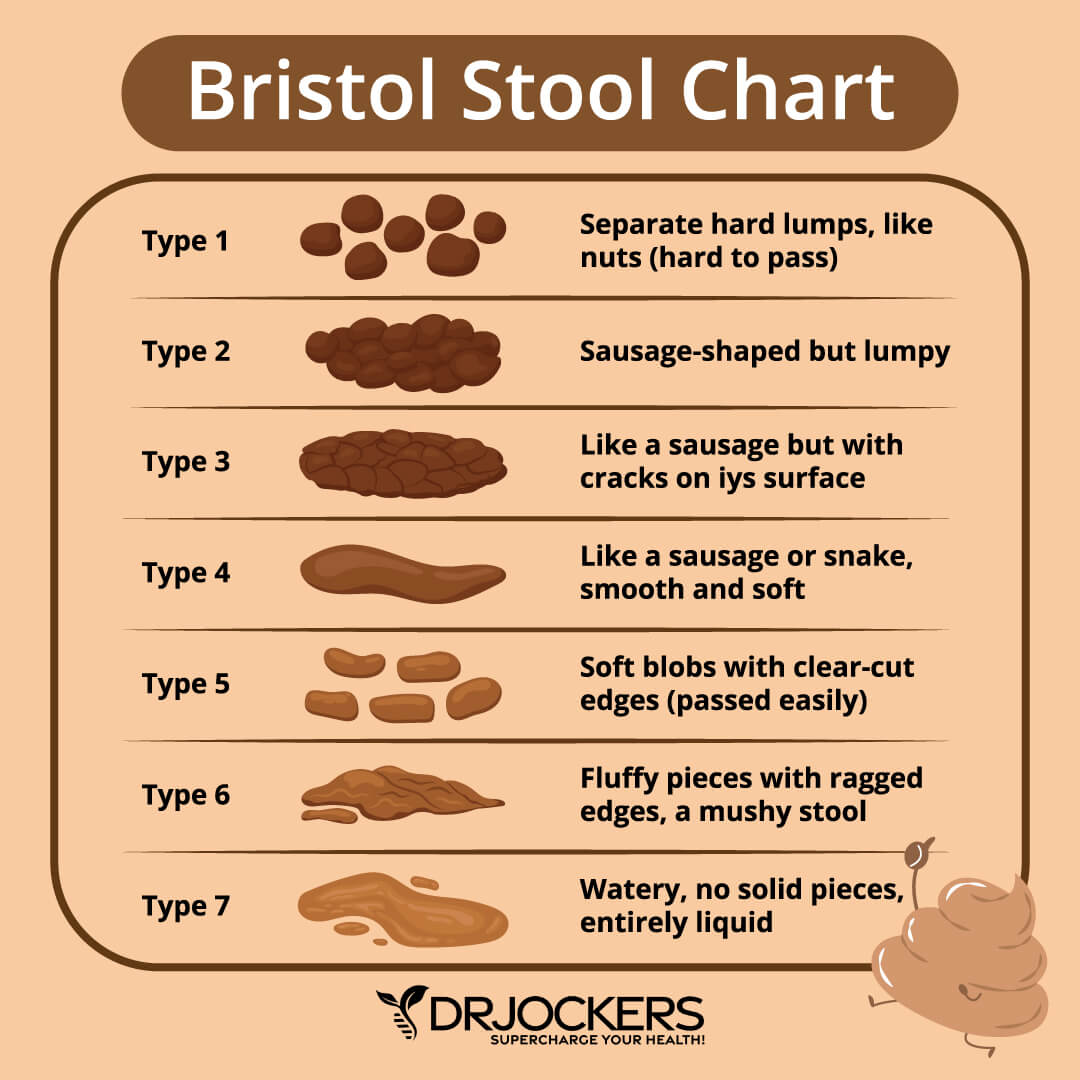
5) Microbial Overgrowth:
SIBO: Systemic inflammation originates from gut problems not only causes bad breath but is a serious health problem. SIBO (small intestinal bacteria overgrowth) is a condition where bacteria overpopulate the small intestines. Playing hosts to such a high overgrowth of bacteria results in elevated levels of the gases they produce throughout the body which triggers inflammatory symptoms.
Candida: Of the numerous microorganisms that break down volatile sulfur compounds and are involved in halitosis, Candida is most frequently to blame. This yeast is generally found in the oral cavity. Food and bacteria that create a white coating on the tongue feed the presence of Candida and therefore its ability to break down sulfur compounds and create mouth odor. (23)
Parasites: Parasitic infection of the gastrointestinal tract is a common cause of bad breath in children but can affect any age group. The presence of parasites creates gut dysfunction, alters pH and gut flora, inhibits the absorption of proper nutrients, and increases toxicity of which bad breath may be a symptom. Left untreated, a parasitic infection can lead to serious health disturbances.
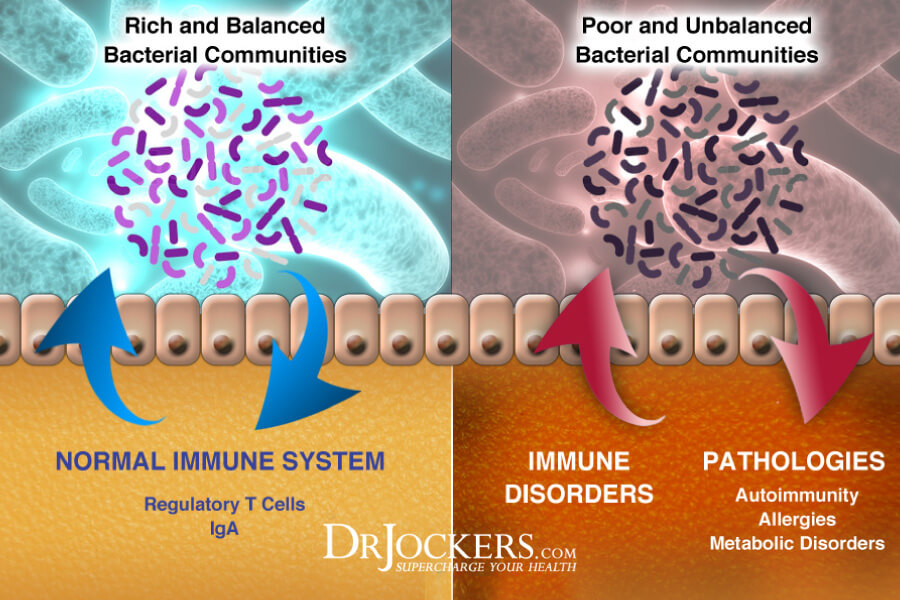
6) Poor Oral Hygiene:
More than 500 species of bacteria exist in the oral cavity of which most contribute to bad odor. Poor oral hygiene is a general cause of most reported conditions of halitosis. The primary sites in which these bacteria reside are the tongue and near the gums around teeth. (9)
As bacteria accumulate, plaque forms increasing the likelihood of cavities, gingivitis, and other inflammatory diseases that contribute to mouth odor.
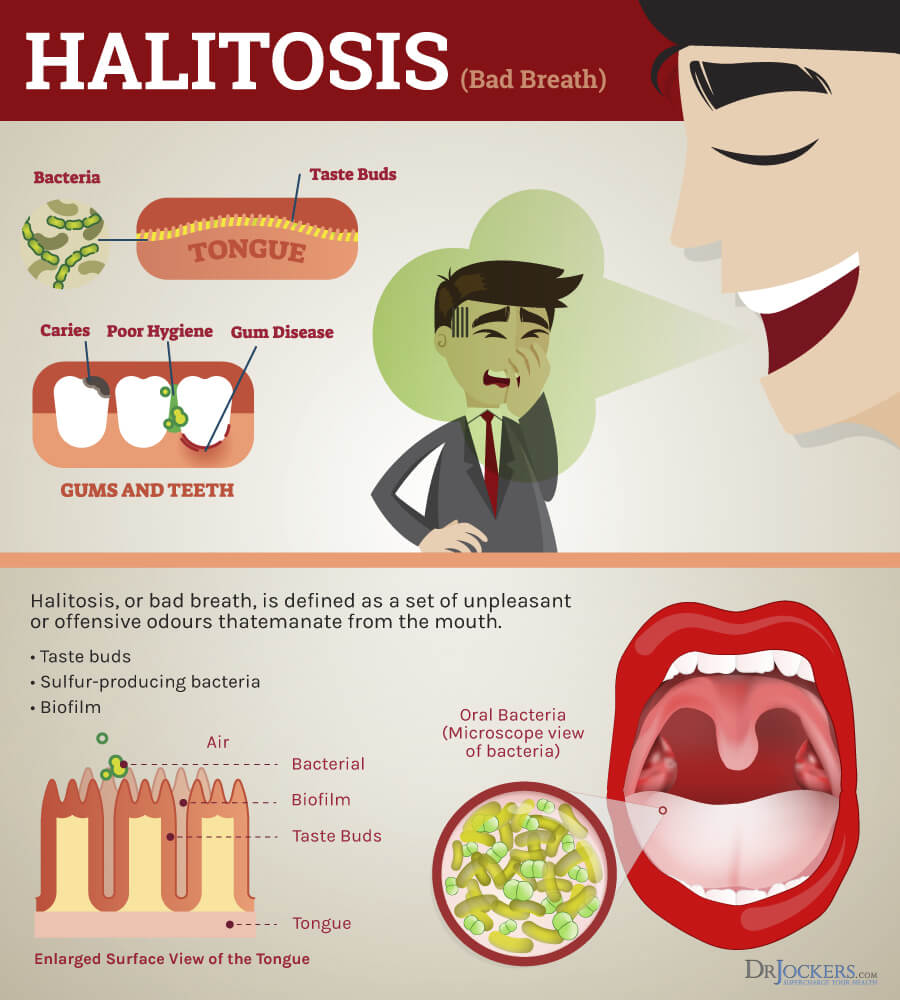
Commercial Breath Fresheners
What products have you used in the past to hide that embarrassing mouth odor? Mouthwashes, mints, gums, freshener sprays, and breath strips are marketed as appealing ways to freshen breath by killing bad breath germs instantly. But do they work?
These commercialized products may help you reduce bad breath temporarily but they also consist of toxic ingredients. The alcohols used in astringent mouthwashes kill beneficial bacteria along with the bad and can increase mouth dehydration. When used daily the alcohol in mouthwashes can dissolve fillings in the mouth leading to an increased risk of mercury exposure.
Here is a list of some of the most common breath freshening products on the market, the ingredients they contain, and the health risks they are associated with: (1, 2, 3, 4)
- Breath Strips: Artificial sweeteners, food dye, thickening agents like locust bean gum and xanthan gum, as well as additives including polysorbate 80, carrageenan, copper gluconate and propylene glycol
- Mints: Sugar, corn syrup, gum Arabic and gelatin
- Breath Sprays: SD Alcohol 38B, artificial flavoring and sweeteners, food dye, and glycerin
- Chewing Gums: Artificial sweeteners, softeners like vegetable oil or glycerin, synthetic food coloring and gum additives
- Mouthwashes: Synthetic flavoring agents, benzoic acid, poloxamer 407, sodium benzoate, caramel and alcohol
Ingredients in these products have been classified as possibly carcinogenic and have been linked to birth defects, wreak havoc on the immune system, cause gastrointestinal complications, increase the risk for heart disease and cancer, and trigger allergies amongst a variety of other devastating health problems (5, 6).
For an inexpensive, natural, and effective mouthwash, I recommend Oral Essentials which you can find here
Natural Strategies To Improve Bad Breath
1) Oil Pulling:
Two methods known as “Graha gandusha” and “kavala graha” have traditionally been used to practice the method of oil pulling as a type of Ayurvedic detox. Oil pulling supports oral health by preventing gingivitis and tooth decay, bleeding gums, freshens bad breath, and can heal a sore throat by removing bacteria. Compared to mouthwashes in the study, oil pulling has been found to reduce plaque and bacteria that cause gingivitis. (11)
Coconut oil is especially effective at reducing microbial overgrowth and relieving inflammation because of the high fatty acid content it contains. Both lauric acid and monolaurin are effective agents to combat infectious growth that contributes to bad breath (12). Using coconut oil, sunflower oil, or even sesame oil, swish 1 tablespoon oil around your mouth for about 20 minutes and then spit out. (13)
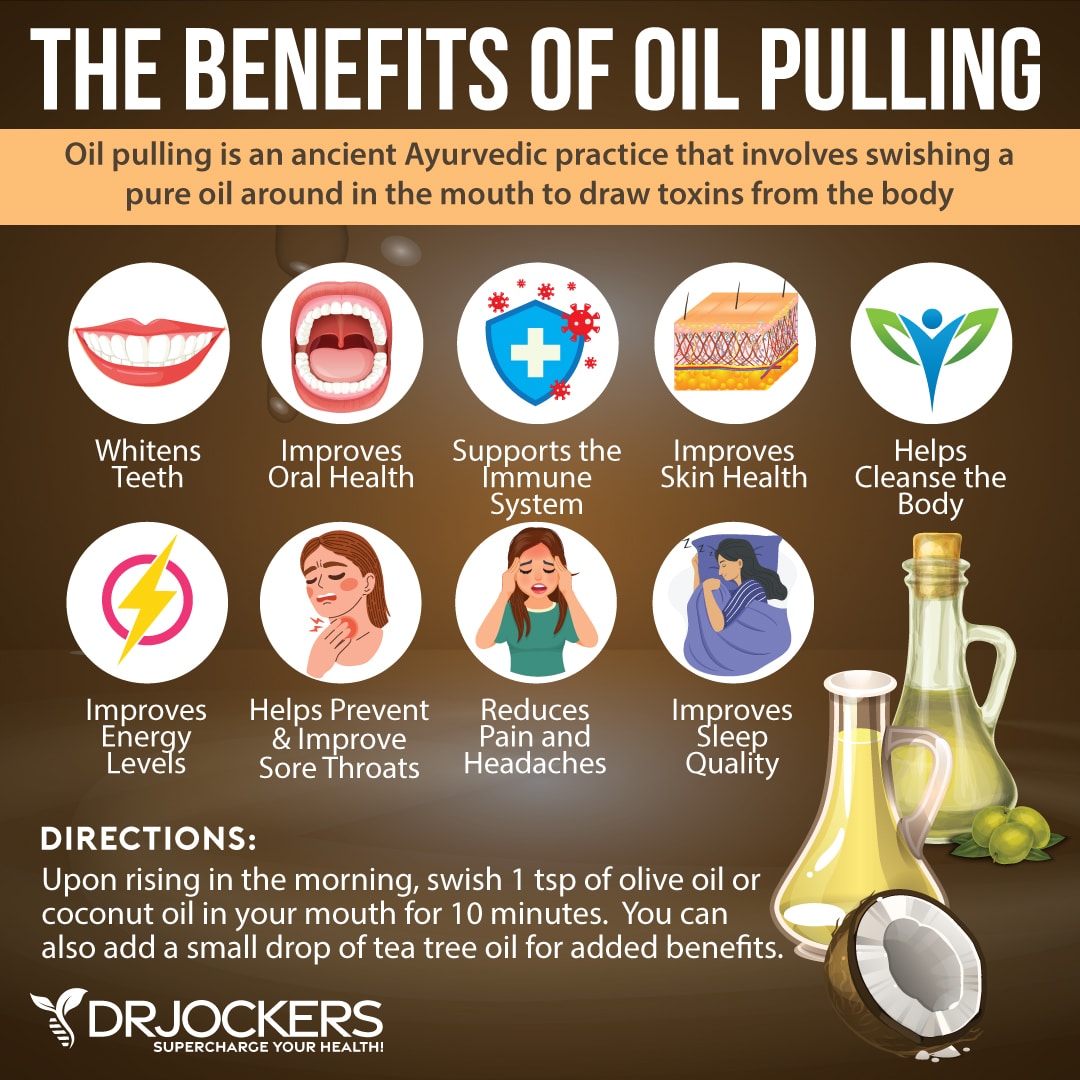
2) Good Hydration:
Maintaining optimal hydration is key for preventing against fowl mouth odor. Water helps flush food debris and bacteria from the mouth and is required for salivary production (15).
As the saying goes, drink at least 8 glasses of purified water daily to help remove toxic, odor-causing substances from your mouth and body. Hydrate immediately upon the first 30 minutes of waking up with 2 glasses of water when your body is most dehydrated and in need of removing toxins from the gastrointestinal tract.

3) Fermented Foods and Drinks:
Foods containing probiotics significantly improve oral health by inhibiting bacterial overgrowth. Consuming these foods aids in decreasing the acidity of the mouth preventing the ability for bacteria to thrive between teeth, on the tongue, and beneath the gum line.
Probiotics prevent plaque buildup and dental decay that exacerbates conditions leading to bad breath. (14) Fermented foods and drinks include grass-fed dairy products like kefir, yogurt, and amasi, pickled vegetables like sauerkraut and kimchi, and Kombucha.

4) Chlorophyll and Chlorophyll Rich Foods:
Foods that contain the pigment chlorophyll are not only superfoods but they help eliminate odor. Foods like parsley, dill, basil, and mint are excellent deodorizers and also contain phytonutrients that help neutralize salivary pH. They are also loaded with antioxidants like vitamin C and minerals which can help decrease inflammation.
Studies show that chlorophyll exhibits strong anti-bacterial properties protecting the mouth from allowing microbes that cause periodontal disease from developing. The antioxidants contained in chlorophyll oxygenate tissue create an environment unfavorable to anaerobic bacteria (16).
For these same reasons, breath-freshening dog treats contain common chlorophyll-rich foods such as parsley and mint. Try combining these herbs with other chlorophyll foods like salads and sip on beverages containing natural deodorizers such as matcha tea.
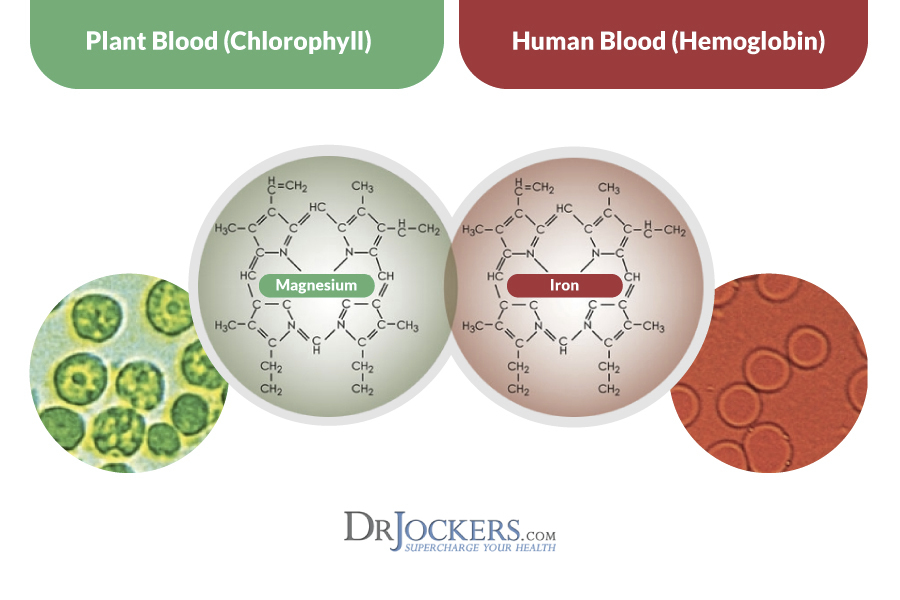
5) Raw Foods:
Raw apple, spinach, parsley, and mint were some of the most effective foods found in a study to act as a breath deodorizer against garlic breath (19). The polyphenols in raw foods and the active enzymes they contain are believed to improve mouth acidity and reduce volatile compounds that give rise to bad breath.
Chewing on the rind of lemon or other citrus fruits will release citric acid to promote salivary production. Uncooked vegetables and fruits are also high in fiber to help cleanse toxins from your digestive tract. Choose local and organic produce when possible.
6) Peppermint Essential Oil:
The pungent odor of peppermint oil can instantly improve bad breath. It has been traditionally used in alternative medicine to treat complications relating to the digestive tract such as IBS (irritable bowel syndrome). Alleviating these problems and improving digestion limits inflammation in the body, inhibits microbial overgrowth and improves conditions of the oral cavity
Peppermint oil contains phenolic compounds and essential oils menthol and menthone that act directly on reducing volatile sulphur compounds. When used in an herbal mouthwash mixture peppermint oil significantly improves mouth odor (17). Grind fresh peppermint leaves and add to your water for an invigorating drink throughout the day or brew your favorite peppermint tea for its oral care benefits. (18)
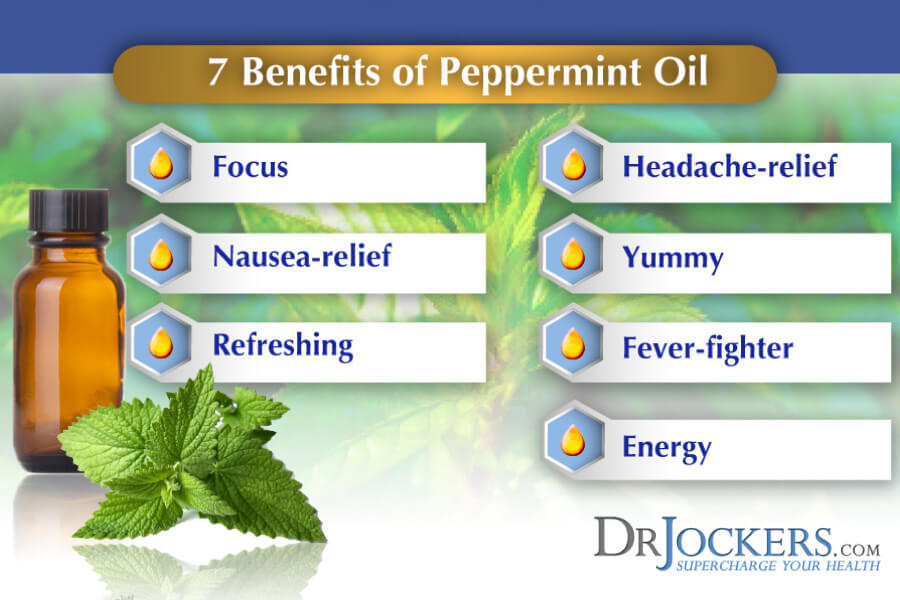
7) Freshening Herbs:
Both fennel seeds and cloves have antiseptic qualities that can help control bad breath. The pungent aroma of these two herbs freshens breath and also has carminative properties to dispel gas, bloating, and other symptoms of indigestion.
In India, fennel seeds are often included with a combination of dried spices to aid digestion and improve breath following a meal. Chewing fennel seeds or drinking tea steeped in fennel seeds helps regulate the pH of saliva in the mouth by reducing acidity and consequently inhibiting bacteria overgrowth. You too can munch on ½ teaspoon of fennel seeds to reduce bacteria that cause halitosis after eating or anytime your breath needs freshening.
Utilize the antioxidant properties in cloves for their anti-inflammatory and anti-bacterial effects by preparing a mouthwash. Steep ¼ tsp of fresh cloves in 1 cup of warm water and gargle and rinse with this mouthwash following brushing. The oils contained in clove will suppress the growth of pathogenic bacteria and can be used daily with no adverse health effects. (24)
8) Oral Care For Bad Breath:
Practicing good oral hygiene involves more than brushing morning and night. A few useful tips on maintaining proper oral care and reducing the occurrence of bad breath follow: (7, 8)
- Brushing: Use a soft-bristled toothbrush that is reachable to all areas of your mouth. Brush at least twice a day, upon waking up and before bed. The physical act of brushing alone will disturb bacteria that latch onto teeth and gums. When possible, brush your teeth immediately following the consumption of foods known to contribute to mouth odor.
- Toothbrush Replacement: The ADA (American Dental Association) recommends that you replace any toothbrush that has frayed bristles and always no later than every 4 months.
- Floss: Bacteria exist between your teeth that cause tooth erosion that shouldn’t go unnoticed. Floss after brushing to remove particles and plaque that can develop on the tooth and under the gum line.
- Tongue Scraping: Tongue scraping allows you to effectively remove odor-causing dead cells, bacteria, fungus, and volatile sulfur compounds. Residue on the tongue is associated with 50% of halitosis cases that originate from problems in the mouth. While extending your tongue, scrape your tongue from back to front. Be sure to rinse your mouth to remove any debris that resides on the tongue’s surface.
- Visit the Dentist: Receiving regular dentist checkups not only helps keep your mouth clean but your dentist can provide insight into areas in your mouth that you may be neglecting.
- Eat Right: Choosing high-quality snacks like walnuts, celery, carrots, apples and antimicrobial spices like cinnamon can quickly remedy nasty odors in your mouth. When eaten raw, these crunchy foods help clean teeth and even contain fibers that stimulate salivary production to fight bad breath.
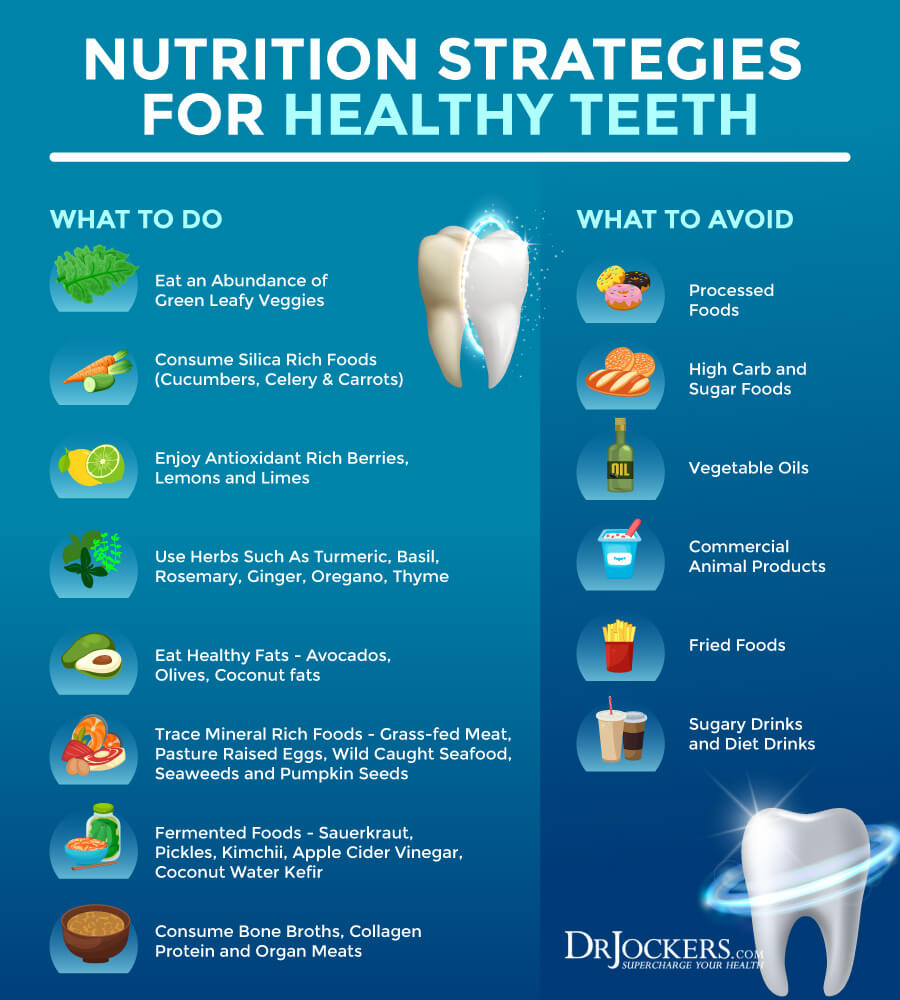 If you want to work with a functional health coach, I recommend this article with tips on how to find a great coach. Our website offers long-distance functional health coaching programs with our world-class team of health coaches. For further support with your health and other goals, just reach out—our fantastic coaches are here to support your journey.
If you want to work with a functional health coach, I recommend this article with tips on how to find a great coach. Our website offers long-distance functional health coaching programs with our world-class team of health coaches. For further support with your health and other goals, just reach out—our fantastic coaches are here to support your journey.
The Inflammation Crushing Ebundle is designed to help you improve your brain, liver, immune system and discover the healing strategies, foods and recipes to burn fat, reduce inflammation and Thrive in Life!
As a doctor of natural medicine, I have spent the past 20 years studying the best healing strategies and worked with hundreds of coaching clients, helping them overcome chronic health conditions and optimize their overall health.
In our Inflammation Crushing Ebundle, I have put together my very best strategies to reduce inflammation and optimize your healing potential. Take a look at what you will get inside these valuable guides below!
Sources for this Article Include:

